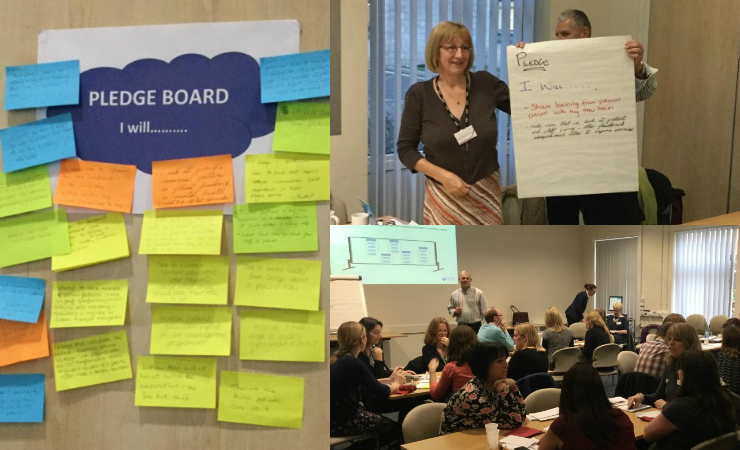
How can we work collaboratively with patients and carers to co-produce and transform clinical services? This was the focus of our latest West of England Academy masterclass, hosted by our colleagues at Royal United Hospitals Bath.
The 41 participants from our member organisations were joined by three inspirational speakers for a stimulating and interactive workshop in which they got to practice using some of the resources from the Kings Fund’s Experience-based Co-design toolkit.
Our three speakers were:
Annie Laverty, Director of Patient Experience at Northumbria Healthcare NHS Trust
Annie discussed how her organisation has put patient experience at the core of their approach to improving care, with positive results in patient satisfaction and staff morale. Attendees were particularly interested in how patient feedback is collected in the morning and delivered to staff directly that afternoon, in a way that encourages staff members to actively use the feedback to improve the way they and their team mates deliver care.
Suzie Bailey, Head of Development at Monitor
Suzie was able to explain how Quality Improvement approaches are being used by the regulator to increase the range of support they are able to provide to front line care providers. In a previous job, Suzie played an important role in the development of the Sheffield Microsystems Coaching Academy at Sheffield Health and Social Care NHS Foundation Trust, and Sheffield Children’s NHS Foundation Trust, in partnership with the Dartmouth Institute Microsystem Academy from the USA, and was able to offer some practical anecdotes from her work there.
Anna Burhouse, Director of Quality at the West of England AHSN
As well as working for the AHSN, Anna still practices clinically as a Child and Adolescent Psychotherapist. She also works on a voluntary basis to help develop the Severn & Wye Recovery College in Gloucestershire, which was set up by the 2gether Trust in 2013 to provide a new way to support people living with mental health problems. Anna shared personal stories about some of the people they had helped, including video clips to emphasise the success of the approach.
In the afternoon, delegates were introduced to the Experience-based Co-design toolkit, working in large groups to consider what observations they might make about their working environment if they were a patient, carer or visitor, with a view to making the environment more attractive for guests. They then worked in small groups to practice interviewing patients in a way that would support their involvement in co-design meetings between clinicians and patients.
Throughout the day there was an extremely positive vibe within the room. The post-event feedback reflected this, with comments on the “inspirational speakers” and being surprised at “how real” the exercises were, as well “how well organised” the event was.
For more information, contact:
David Evans, QI Programme Manager
0117 900 2249
david.evans@weahsn.net
For details of forthcoming events, check out our Events section. Read the evaluation report here.
Posted on December 2, 2015


